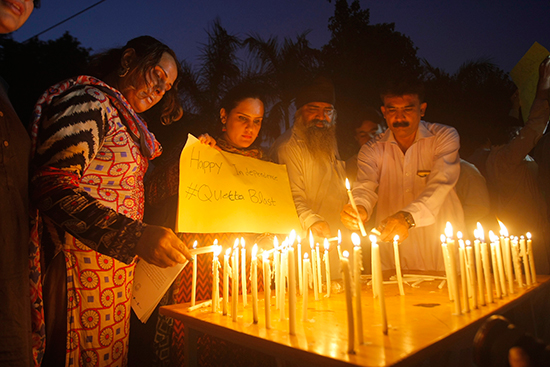At least two journalists killed in Pakistan blast
| Publisher | Committee to Protect Journalists |
| Publication Date | 8 August 2016 |
| Cite as | Committee to Protect Journalists, At least two journalists killed in Pakistan blast, 8 August 2016, available at: https://www.refworld.org/docid/57b2d2234f.html [accessed 5 June 2023] |
| Disclaimer | This is not a UNHCR publication. UNHCR is not responsible for, nor does it necessarily endorse, its content. Any views expressed are solely those of the author or publisher and do not necessarily reflect those of UNHCR, the United Nations or its Member States. |
Washington, August 8, 2016 – At least two journalists were among at least 70 people killed in a massive bomb blast at a hospital in Quetta, Pakistan, today, according to press reports. The Committee to Protect Journalists condemned the attack.
 Civil society activists in Peshawar pay tribute to the victims of a bomb attack on mourners at a hospital in Quetta, August 8, 2016. At least two journalists were killed in the blast. (AP/Mohammad Sajjad)
Civil society activists in Peshawar pay tribute to the victims of a bomb attack on mourners at a hospital in Quetta, August 8, 2016. At least two journalists were killed in the blast. (AP/Mohammad Sajjad)
Mehmood Khan, a cameraman for DawnNews, and Aaj TV cameraman Shehzad Ahmed were at Quetta Civil Hospital reporting on a gathering of mourners grieving the murder of Bilal Kasi, president of the Baluchistan Bar Association, the reports said. Ahmed died at the scene of the blast, according to the Pakistani advocacy group Freedom Network, which promotes freedom of expression. Khan died in hospital soon after the blast, Dawn reported on its website. A reporter for the media company Dunya News known only by his given name, Faridullah, was also injured in the blast, his employer reported.
Responsibility for both attacks was claimed by the militant group Jamaat-ul-Ahrar, which was added to the U.S. State Department's list of global terrorist groups last week. Militants in Pakistan have repeatedly staged secondary attacks to target mourners following a first attack, or people rushing to the scene. Such secondary attacks put journalists, who often cover the funerals and the aftermath of bombings, at special risk.
"This deadly attack underlines the extreme dangers journalists face working in Pakistan," said CPJ Asia Program Coordinator Steven Butler. "The deaths of Shehzad Ahmed and Mehmood Khan testify to the bravery and dedication of Pakistan's press corp."
Baluchistan has long been mired in conflict involving separatist groups as well as militant offshoots of the Taliban and Al-Qaeda. Jamaat-e-Ahrar, a splinter group of the Pakistani Taliban, has been blamed for attacks targeting civilians, religious minorities, military personnel, and law enforcement. It claimed responsibility for the Easter attack this year on Gulshan-e-Ikbal Park in Lahore, which killed 75 people, mostly children. The U.S. State Department says the group killed two Pakistani employees of the U.S. Consulate in Peshawar in March 2016.
Today's deaths bring to at least 60 the number of journalists killed in Pakistan since 1992, making it one of the most dangerous countries in the world for journalists.
